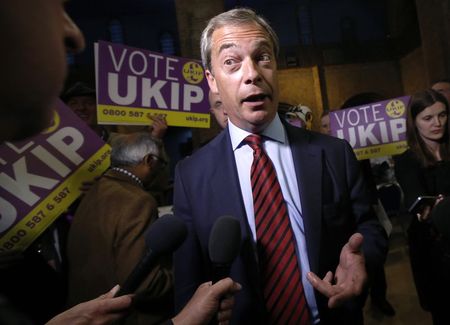By Julia Fioretti
BRUSSELS (Reuters) - The UK Independence Party succeeded on Wednesday in forming a European Parliament grouping with other euro-sceptic parties, giving it access to more money, staff and speaking time.
UKIP leader Nigel Farage snatched a defector from France's far-right National Front, giving his group the minimum seven-nation representation it needs for parliamentary recognition.
Farage and the National Front's Marine Le Pen have been competing with each other to woo parties to join their respective groups after their resounding victories at the European elections in May.
Farage's new Europe of Freedom and Democracy (EFD) group counts Italy's anti-establishment 5-Star Movement led by the iconoclastic Beppe Grillo, Lithuania's Order and Justice Party, the Sweden Democrats and single members from the Czech Republic, Latvia and, crucially, France.
"I am very proud to have formed this group with other MEPs and we undertake to be the people's voice," said Farage in a statement.
"Expect us to fight the good fight to take back control of our countries' destinies."
Anti-establishment parties across the continent more than doubled their representation in the elections, tapping into voters' anger with Brussels over austerity, mass unemployment and immigration.
The defection of Joelle Bergeron from the National Front gives the EFD more powers to support or block legislation, get greater access to funding and sit on committees.
Bergeron left Le Pen's anti-immigration party just two days after being elected to the European Parliament.
Before the election she had sparked a furore within the National Front for suggesting that foreigners who work and pay tax in France should have the right to vote.
Farage's success in forming a group in the 751-seat legislature leaves Le Pen scrambling for partners to form her own coalition.
The European Conservatives and Reformists, formed by British Prime Minister David Cameron in 2009, added Germany's anti-euro AfD party to its ranks last Thursday, becoming the fourth largest group after the centre-right EPP, Socialists, and centrist Liberals.
Le Pen is still struggling to find parties from two other countries to enable her to form a group, and has repeatedly ruled out joining up with Greece's far-right Golden Dawn or Hungary's Jobbik, deeming them too extreme.

She has until next Tuesday to form a group, failing which the National Front and others will be known as "non-attached members".
On May 28 she announced she had teamed up with four other parties, including Geert Wilders' Dutch Freedom Party, and dismissed doubts that she would be able to find two more allies.
(Reporting by Julia Fioretti; Editing by Ruth Pitchford)
